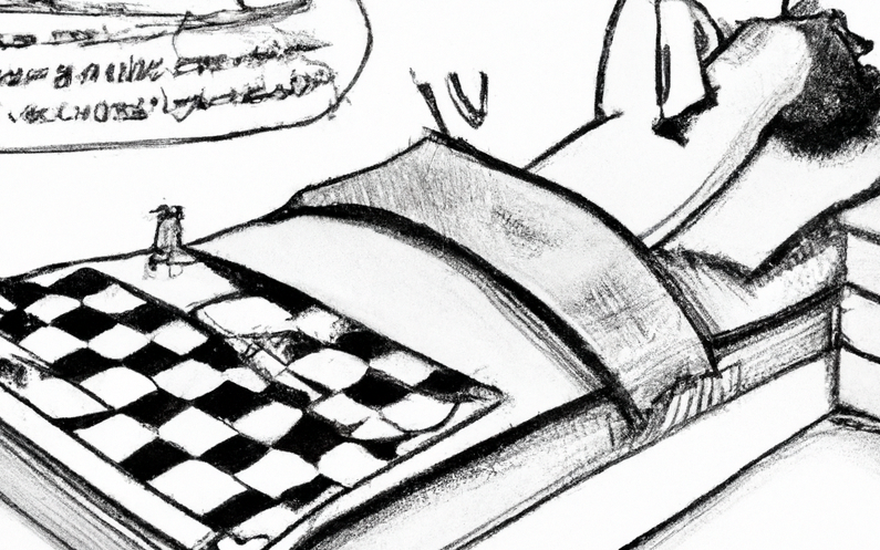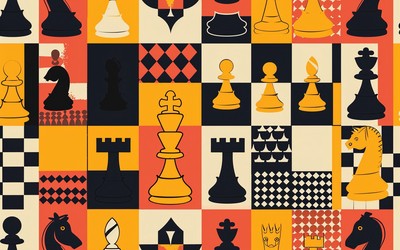
DALL-E
How To Deal With Tournament Anxiety
When you're about to play an OTB tournament...On Friday, a week before the start of my OTB tournament, I officially had my first freak out. I woke up around 4 a.m. in a panic about certain lines in my Black repertoire.
Why does our anxiety so often attach itself to openings, even when we know that the game is rarely decided in this phase? I think it comes down to the illusion of control. In the middlegame and endgame, it’s clear that we could not possibly prepare for every situation we might encounter. We just have to cross those bridges when we come to them, because there is no other choice. But in the opening there is at least the hope that we could be ready for everything.
This is, of course, an illusion. It is not remotely possible to be prepared for every move an opponent could throw at you: there are far too many possibilities. But our brains are not very good at math, and the possibility seems just plausible enough that our desire for control latches onto it.
I got out a notebook and wrote down the lines that were bothering me. In total, there were five. I have plenty of time to address those before the tournament. Realistically, the bigger danger is the unknown unknowns: weaknesses in my repertoire I’m not aware of. Nonetheless, writing down the ones I could think of helped me get back to sleep.
Here are four more suggestions for managing pre-tournament anxiety:
Name your fears
IM John Bartholomew revealed that before every tournament he fears he will lose all his games. His strategy for dealing with this is to treat this fear as an old friend.
https://twitter.com/fins0905/status/1692734409969971638
Of course, everyone’s fears are different. I’m not really afraid of losing all my games. If I were to try to put words to what I’m actually afraid of, it would go something like this: I will lose in a way that reveals that my own training is in fact embarrassingly haphazard and unprofessional, and this will cause people to realize that I’m a fraud and stop listening to what I have to say.
Once stated out loud, these fears don’t make a lot of sense. I may lose. I may even lose in very embarrassing fashion. But one of my main reasons for playing in the tournament is to put myself in the position to do exactly that.
Remember why you’re playing
I want to put myself under the pressure of an OTB tournament in order to become a better coach. When you’re sitting on the sidelines it all seems pretty simple and easy, but anyone who’s actually played in an OTB knows that the reality is never so simple. Even though my main goal in chess is not to increase my own rating, I decided it’s important to stay in touch with the feeling of competing in tournaments to be a better coach.
Another reason is to catch up with old friends and make new friends. Between the pandemic and having a baby, it’s been a long time since I’ve been able to connect with other chess players in person, and I think those relationships are really important.
Finally, one of my favorite parts of chess tournaments is getting to experience sustained focus. A chess tournament is a very intense competition, but it’s also a meditation retreat: a period of time you set aside for yourself to experience focus in a group of like-minded people. For most people, the tournament environment allows you to access a much higher degree of sustained focus than is possible when sitting in front of your computer. In our hyper-distracted era, it can be refreshing to remind yourself that you are capable of focusing for hours at a time. We shouldn’t forget how luxurious this is.
Reasons for playing, like fears, are highly personal. Yours will no doubt be different from mine. I would just suggest thinking about reasons for playing that don’t involve competitive success. If your only reason for playing a tournament is to win games or rating points, you’re setting yourself up for disappointment. You can do everything possible to prepare, but the reality is, you don’t control your results in any given tournament. Your opponents’ play and your own form are both highly variable. If the only outcome that will make you happy is winning a lot of games and rating points, you’re going to walk away from a lot of tournaments feeling dissatisfied.
Make peace with your preparation
Many people see preparation and tournaments as separate. You prepare so that you can do well in the tournament, right?
I prefer to look at it differently: chess improvement is a continuous process, and playing tournaments is part of the process. (Maybe the most important part!) The tournament isn’t separate from preparation, it’s all one process. In that sense, you don’t need to do anything special to prepare for a tournament, apart from what you normally do to work on chess.
To the extent that you do want to do tournament-specific preparation, it should focus on preparing to leverage the skills you already have as much as much as possible, not developing new skills. When you register for a tournament there is a temptation to try to radically upgrade some part of your game, or even become an entirely different chess player. That type of process takes months, probably years, and is anyway part of the continuous improvement process, so it doesn’t make sense to tie it to a specific tournament. When a tournament is approaching, the most impactful things you can do are to make sure you’re well-rested, well-fed, and as relaxed as possible.
For better or worse, the skills you have for this tournament are the skills you have right now. So it’s best to make peace with your level of preparation, whatever it is, and get ready to use it as best you can in the tournament. I’ve found that keeping a tournament notebook is helpful for this process. Any worries that arise during the tournament – an opening line I realize I’m not prepared for, a theoretical endgame I don’t know, whatever – I write down in the notebook. This helps me let go of those worries for the tournament and focus on using the preparation I have. After the tournament I can go back and review the notebook and see if those things make sense to address in my study plan, or if they were just random mid-tournament freak outs.
Develop skills for calm
Like tactics or calculation, calming your mind is a skill you can develop. Imagine you’re rolling back and forth in your hotel bed, thinking about a big game coming up the following morning. Do you have a strategy to calm down and fall asleep?
The way I was finally able to fall back asleep after my 4 a.m. freak out was to listen to a guided sleep meditation on the app Calm. I’ve gone back and forth on maintaining a meditation practice, but it can certainly be a useful tool for addressing anxiety. If you’re looking for something more chess-specific, my friend Benji has a course on mindfulness for chess, with guided exercises for addressing scenarios like a painful loss. I’m planning to use some of his exercises during my tournament.
Of course, any strategy you choose to use will be more effective if you practice it regularly, not just when you have a tournament. And there are many benefits to having tools for dealing with stress outside of chess.
Wrapping up
I hope you find some of these strategies helpful for your next tournament. What techniques do you use to deal with stress and perform at your best?
If you liked this check out my newsletter where I write weekly posts about chess, learning, and data: https://zwischenzug.substack.com/
If you're interested in 1:1 coaching, send me an email at coaching@natesolon.com




